Flat Stanley and Grandpa
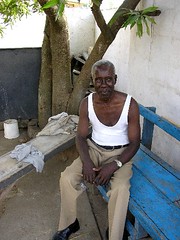
This man I know only as Grandpa is 74 years old! He looks so much younger than that to me!
It is foolish and hazardous not to dance in Africa. -Dan Eldon

This man I know only as Grandpa is 74 years old! He looks so much younger than that to me!
Learned: funerals are often held months after the death of a person, especially if that person is a chief. The bodies just chill in hospital freezers. Normal people have their funerals several weeks or up to a month later. I imagine that has to do with saving money for the funeral and subsequent festivities. I’ve been asking everyone about the mentality of the clapping and dancing and it seems that it’s a fairly new thing, perhaps based partially on consumerism. But most Ghanaians themselves don’t seem to understand it.
Feared: I’m convinced that I’m going to fall in a hole or gutter. And/or accidentally drink tap water.
Compared: The women carrying their children strapped to their backs with cloth. Last night I saw one from afar in the dark and couldn’t help but think of a Japanese kimono, the child like the big bow in back.
Observed: Walking home last week around 10 pm, I saw lots of people sleeping outside. Some of them had mattresses—too hot to sleep inside. An occasional man would be sleeping outside a storefront—security. But there were also homeless people, with cardboard on corners not obviously in front of a house or business.
I met Abigail at a supermarket on the main road where she works on Friday. When she asked me for my number, I happily complied—finally a female asking to be my friend instead of a man!
Saturday morning she called at 8 am. Don’t these people ever sleep in?! It seems not.
Since I couldn’t get back to sleep, I decided I might as well add a visit to her home to my agenda for the day. I met her near my workplace and we went to her house together. She left with me her 3 and 4 year old niece and nephew while she made me some bangku, a local dish (to be described soon, once I get a picture!). The children played school with me, asking me the colors of things. When the boy touched my skin, I said, “obruni” (white person) to draw a laugh. They seem intrigued by my skin, particularly my moles. Even yesterday an adult asked me about them. (As well as a “what happened to your face?” from a young woman sitting next to me on the tro-tro. The dirt, grime, sweat and oil that this heat and humidity cause, that’s what!)
After eating the bangku, we set out for the beach. The beaches are not nearly as crowed Saturdays as they are on Sundays. It was hot, the middle of the day, and we couldn’t find any shade, so we made our way to my house for some water. She’s a nice girl, my sister’s age of 22. She’s dating a widower but doesn’t seem to be particularly into him, since he’s older, doesn’t really talk or like to go out…At least he doesn’t hit her like her last boyfriend. When a man’s wife dies it is believed that he should wait a year before getting married, though I think it’s actually meant that he should wait a year before he is with another woman.
Conversation was okay, with moments of silence, but nothing too awkward. She waited while I quickly showered and helped me to get a tro-tro to Labadi Beach (pictures already posted below). Over the past few days, I’ve gotten a lot of calls from her, just checking up on me. Almost too much…
I keep thinking of what my friend Terri told me one of her professors said that the people who interact with foreigners are usually themselves on the fringes of society. I’m not saying she is, but I’m now aware of the trend, I look for it. It was certainly true of some of the people that Terri and I met while she was visiting me in Malaysia.
The day at the beach was nice. The people peddling things were far less persistent and pesky than those in Dahab, Egypt. Good music, shaded tables and with the ocean breeze, quite bearable weather.
In the evening I went with some Americans to a ‘house party’ of another American. The place was posh, there was a live band and a free bar. Over half the people were expats and I was surprised at how I’d already met about 10 (internet café and my ‘obruni compound,’ mostly). I danced the night away and am still unsure of where all the energy came from, given two long beach walks and spending most of the day outdoors.
At 4 am, a contingent of us went in search of post-party food and managed to find an open stall. It’s not like Malaysia or Egypt, where there’s always something open. I think the two guys were asleep when we first got to the stall, but they still cooked us up some rice. Walking home with two other American girls and an Australian guy, a motorbike with two people on it came towards us. I was a bit separate from the others and one of the guys on the bike grabbed my right arm. Molly yelled, “Leave her” (this is the kind of language you develop when living abroad, not quite normal English) and Scott came toward them and then they were gone. The whole thing only took a minute to happen, but served as a good reminder to keep your guard up and travel in packs late at night. Plus, once we made it to the main road, we took a taxi.
We ate salad, hummus, lentils, rice, and avocado. The first truly balanced meal I’ve had here. It was bliss.
I had a good time, too. It definitely seems like it would be easy to fall into the ex-pat crowd, but I’m making every effort to fight that, though it’s tempting and seductive and easy. It’ll be nice to have these other foreigners as backup as I attempt to forge Ghanaian friendships.
And it’s happening, slowly but surely. A boy I met at the internet café stopped by my office a few days later to deliver me a local newspaper clipping from last year about women’s rights that he thought I’d be interested to read. It was cute. So last night I met him at a ‘spot’ near my house that is hopping on Thursday nights with a live band. He’s my age, studying economics, and…well, he just may find this so I better not say anything else! :D
When I was walking down the street yesterday, a group of men at a storefront kind of beckoned me over; I said hello but kept on going. Less than half a block later, a group of women in their compound’s courtyard called out to me. I stopped and joined them, learned their names, pleased them with the few words of Ga I know, was surrounded by children that came out of the woodwork, and was given some plantain chips.
Today, two small boys on the street were looking and smiling at me, so I said hello. One took my hand; his mother had the other and together we walked a little ways, lifting him over the open gutter (full of trash and urine) and then crossing the street. In the course of a block, I felt as though I was an old friend of the family.
I wandered back down to the beach. No dead bodies this time, but I did see the fishermen pulling their boats ashore with the day's catch. Other men come daily to assit in pulling the boats in, a heave-ho, tug-of-war motion, while singing a Ga song. They're rewarded with a couple of fish each and some very solid muscle mass. To make it slightly easier, they put down wooden planks and the boat rests on a round piece of metal, to help roll it in. I plan to go back another day and take pictures.
I found the kelewele woman.
Then I found a fried insect in my fried plantains.
My first reaction was to be grossed out, but then decided it wasn’t that bad. I recalled from a book, First They Killed My Father, that Cambodians ate anything they could, including insects, during the famines under Pol Pot. And last April I voluntarily ate a fried caterpillar on the streets of Bangkok. Still, I put the rest of the kelewele in the refrigerator. I felt bad throwing it out in front of my Ghanaian housemate who didn’t seem to think it was a big deal. I’ll decide later…
Later, as I ate cheese and canned tuna on toasted bread (my first attempt at ‘cooking’ here, besides warming up leftovers), I thought of the dead man’s missing skin. What does tuna eat? Or what does what tuna eats eat?
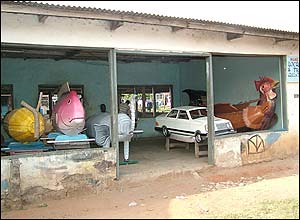

Where I work
WiLDAF is dedicated to promoting and strengthening strategies that link law and development to increase women’s participation and influence. Being exposed to—and involved in—WiLDAF’s work, I will be able to see how these interests intersect and complement each other. As I struggle to figure out what the heck to do with myself long-term, the connections between human rights, development, and peace studies interest and confuse me even more. Recently I signed up to take the Foreign Service Exam in April, just to see where that might lead (that would allow me to be abroad, with a good salary, but less likely to be helping people who actually need it).
But back to WiLDAF. WiLDAF-Ghana employs a rights-based approach in its legal and development work. Its priority issues are: fostering rights awareness and action, advocating law and policy reform, access to and control over economic resources and confronting violence against women. Having identified ignorance as one of the factors that hinder the development of women, WiLDAF-Ghana has embarked on a rights awareness program and offers legal counseling at its field offices. WiLDAF-Ghana has trained over four hundred leaders of grassroots organizations on legal education and leadership skills since 1993 when it began. This training has equipped women leaders with the basic knowledge and skills to enable them to further train their members and communities to make use of laws, specifically relating to intestate succession, marriage and divorce laws, wills and maintenance of children. In 2004 alone, over 1,600 communities benefited from educational workshops. In addition to legal counseling, training and capacity building, WiLDAF-Ghana engages in research, advocacy, and networking activities focused on promoting women’s rights.
Most of the hands-on work is done at the field offices in Ho and Takoradi, which I plan to visit.
Monday afternoon I was told that I should make a powerpoint presentation for a reception for Ghanaian female parliamentarians for the next day. The problem was that our office lost power…again. In my two weeks here, it’s happened at least 4 or 5 times. Not only does that mean computer work can’t happen, it means the air conditioner doesn’t work. Ugh. Luckily, Tuesday morning the power was working (though it went out in the afternoon) and I churned out a powerpoint full of images of African women to cycle through during the event. I also did research for a speech and outlined another speech. [I found out that Rwanda’s parliament has the highest representation of women in the world, with 48.8%! The US was ranked 57th, with about 15% female representation, if my memory serves me. That’s behind South Africa, Namibia, Uganda, Ethiopia, and Senegal, to name a few. A lot of African countries are establishing quota systems (at 30%) at either the government or party level.]
The reception was held at one of the nicest hotels here in Accra, La Palm. There were decorations, a band, and a drink-serving station in the terrace area. The invitations had said 5 pm…no one came till 6 pm! After some speeches, the band started playing…and the politicians actually danced! It was amazing and refreshing to see politicians who just seemed to be normal, real people.
Observation: everyone in our office seems to whisper when they’re on the phone…and I can never hear them say good-bye, though they claim they do (or else thank you). When someone visits our office, they also whisper. But my colleagues don’t whisper to each other or to me generally. Just when it comes to dealing with others who are not working at our office…
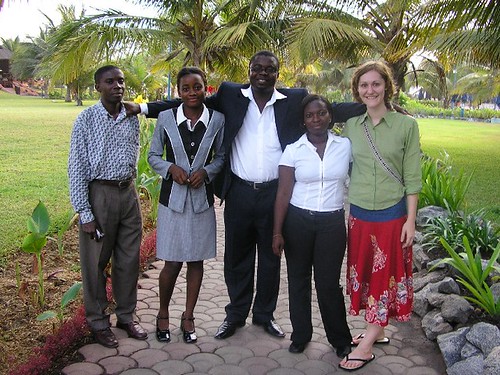
I emailed “Nana from Ghana,” a Yalie who graduated my year, but whom I didn’t know personally, before arriving. It turned out that she would be in Ghana for 3 weeks when I first arrived and we agreed we should meet up. Sitting in a taxi in Osu, with traffic backed up, I looked out the window and made eye contact with a girl walking past. We stared at each other…she certainly looked like the facebook picture I had seen and a girl I’d remembered passing by on campus. And it was! A moment from Sliding Doors.
A few days later, I went with her to her house, which is in a really nice gated community in Airport East. Her home was beautiful and she had “servants.” She said that back in the US, people never understood that it was cheaper to have a gardener than to buy a lawn mower, cheaper to have your wash done than to buy a washing machine. There is certainly a wide gap between the haves and the have-nots here. It seems most of the rich people have spent time abroad, either studying or working. But to be able to afford to go abroad, you have to already be rich, so I’m not sure how that all works out yet.
Nana is currently at Yale Med, but wants to end up working in Ghana. I read in the newspaper that doctor and nurse salaries are among the lowest worldwide (doctors make $230/month and nurses just$92/month). Nana said that there is a joke that if the slave ships were to come again, all the doctors in Ghana would be the first to rush aboard. A joke about the slave trade?
I saw a Ghanaian tele-drama on TV last week called “Home Sweet Home.” Nana’s younger sister is actually in it! The one who couldn’t cook. Sounds familiar…
Funeral Party?!
I heard music from my office Friday and went out to the street to see what it was. About a dozen people where clapping and dancing in front of an ambulance, followed by a tro-tro full of people. It was a funeral procession, I was told. The body was being moved, from where to where I don’t know. I also learned from Nana’s mother that people wear different colors to funerals, depending on the reason of death. I think this is it: if sudden, black; if after an illness, where there was suffering, so maybe it’s better that the person has died or the person is old and has lived a full life, white with some black; some clans also add red to the outfit, but I don’t have the specifics on that yet.
I asked my boss’ husband about the funerals and he said that it was the low class that did this clapping and dancing bit and that there are proper, somber funerals at churches for respectable people. He said that those who are clapping and dancing are often drunk and “riff raft.” I could smell the classism oozing out of his statements.
FYI: I saw those elaborate coffins on my first day here, on the road from Teshie to Osu! A rooster, a cow, a bottle, a plane.
MishmashA few observations over the past two weeks: I’ve never seen so much public urinating in all my life combined! There is also no problem with breast feeding in public. And not that many people smoke it seems. Also forgot to mention in a previous post that kids in schools must shave their heads, even the girls (a hygiene thing).
The government just eliminated petrol subsidies, so the price of fuel went from 20,000 cedis/liter to 30,000. Taxi and tro-tro prices have increased and it is likely that the prices of goods will also, given that the cost of transporting them will increase.
My first impression of Accra was misleading, since I was confined to my office and the dirt roads of the residential suburb of Teshie Estates. My wanderings last week were mainly to Cantonments Road, also known as Oxford Street, full of restaurants and businesses (I haven’t run into any malls yet) and obrunis. My wanderings on Saturday took me through the administrative areas—ministries, government buildings, businesses and organizations operating out of large houses. Tree-lined streets. The makings of a former colonial district if ever I saw one. From there, Adabraka became like Osu’s side streets. The roads were all paved and there were traffic lights (obeyed). I walked up to Circle, did a short stint at Busy Internet, the Internet place to be (free wireless!) and then walked down Ring Road all the way back to Osu. I treated myself to ice cream along the way and just barely managed to drag myself the rest of the way home. I probably walked a total of 3.5 hours, which is a lot in the sun and humidity.
Sunday stroll
Today I decided it was about time that I see the ocean up close and personal. Taking the most direct route, it only takes about five minutes to get to the beach, though this portion is not particularly pleasant—loads of trash. On the way, I passed by a woman who called hello to me and addressed me as Akosua. This is the name that girls born on Sunday are given, which just happens to be me! Whenever I hear someone call me that, I am surprised—how did they know I was Akosua?! I think they call me other things nearly as much, it just doesn’t register as much!
I continued on my way and her nephew Abraham caught up to me and wanted to walk with me. I decided it couldn’t hurt anything, since his aunt had been so nice and knew that walking with someone would prevent others from attempting to bother me. He and his younger siblings are staying with his aunt because his mother is working in Germany (and recently married a German). He’s 21 and studying to be a mechanic.
As we approached Osu Castle, I saw something up ahead on the beach that made me stop.
Is that a dead body?!
Abraham looked to where I motioned and confirmed that it was.
I couldn’t help but look again; the stomach was bloated, arms and legs stuck straight out, stiff. The skin looked white, but that’s only because the black part had been eaten away by the fish.
My mind flashed to the tsunami.
If ever I thought I could do humanitarian aid work following natural disasters, I think I was sorely mistaken. I don’t have the stomach or heart for it.
And I will not be doing any swimming.
CircusWhen we got to the other side of the castle, there were crowds of people playing in the surf. There was a group of young men and boys doing gymnastics, the caterpillar, and break dance moves, their falls cushioned by the soft sand. When they saw me watching, they pulled out their best moves and I was most definitely impressed and amused.
Further down the shore, there were horses, some being ridden for a fee, others being washed in the ocean.
Each person in another group had a puppy. At first I thought they were washing them, but then I’d see a dog fly up into the air, or thrown out to battle over a wave. Abraham claimed they were teaching them to swim, but it all seemed a bit cruel to me.
Boys were playing soccer; women sold drinks and snacks—transporting the trays on their heads. At the far end, we got to the Rasta section and I smelled brief breezes of ganja in the air. Given how crowded it was, mostly with men, I’m glad I had Abraham with me to ward of any possible annoyances.
Another worldSherif, the Egyptian I met Friday night, picked me up Sunday afternoon to take me to the café at the Golden Tulip. I was transported away from Ghana. Two Egyptians and a Tunisian met us there and I got to brush up my Arabic and use all my tired, lame jokes that I always pull out to impress Arabs. The whole café was full of Lebanese (who are a major force here, owning a lot of businesses and restaurants. The Lebanese in Ghana are like the Chinese in Malaysia and the Jews in the US) or other foreigners. The pool looked inviting and a definite escape route should Accra ever get to be too much (ala the Nile Hilton in Cairo). I definitely felt like I wasn’t in Ghana anymore. While I was having a good time, part of me feels like I was cheating myself because I wasn’t hanging out with Ghanaians. But I haven’t met many Ghanaians yet, so all in good time, I tell myself.
My conversations with Sherif were…interesting. He’s Coptic Christian and I learned about how the Copts are discriminated against in Egypt. Throughout the rest of our political conversations (Bush, Iraq, Palestine, etc), I felt as though he was sounding more American than me and I was more Arab than him.
On Saturday, I decided to go on a self-guided walking tour of the town, to see more of it and get a sense of how things were laid out. First, I walked from Osu to the National Museum in Adabraka. I’m not usually a museum person, but planned it this way because I still don’t know many people and had no plans, it was something educational to do, and I assumed I couldn’t just walk continually.
There was a group of school children, about 10 years old, going through the museum. When they got to the exhibit on slavery, I lingered. A friendly teacher saw me and came over to ask if I was enjoying myself. I said, yes, the museum was nice and I was interested to see how slavery was taught to the children. He said something like “this is what your people did to us,” but not in a mean way at all, and invited me to join the class. I didn’t want to be a disturbance, some of the children had already said hello to me and I thought it best to keep to the edge. The lead teacher asked the children what famous blacks they knew from outside of Ghana. Rinaldo was the first, followed by a few I didn’t hear/didn’t recognize. The teacher who had spoken to me offered Mike Tyson. The lead teacher than said that these people were not “pure white,” that they had come from here. He said slavery was when people were kidnapped and made to work, without being paid. That was about the extent of the lesson, but the kids looked though the exhibit briefly, before exiting through a mock “Point of No Return.”
I read that a male slave was worth 300 cowries (1000 cowries = 1 shilling at the time); a woman slave worth 400. An ox worth 500 and a sheep 150.
An exhibit of a shipwrecked slave ship explained the system. Trade goods from Europe (muskets, gun powder, brandy and textiles) would come to Africa; Slaves, ivory and gold would be transported from Africa to the Caribbean; colonial goods like sugar, rum, cotton, and mahogany would be carried from the Caribbean back to Europe. This system allowed the ship to be full of goods on each leg and maximize profits. A sign noted that this was one of the first forms of globalization.
When I’m walking down the street, I’ll hear people calling “Obruni,” the word for a white person. It’s said to make me look, to greet me, to beckon me over to buy something. It’s not said with hate, but I wonder how could they not hate whites? After hundreds of years of slavery, then colonialism…
I don’t feel collective guilt for the slave trade, just like I don’t feel responsible for Bush’s misguided war; but at the same time, I wonder if I should. It is hard for me to imagine black leaders would assist the Europeans to enslave their brothers and even harder to comprehend that there are still some forms of slavery going on today (children soldiers, for example).
I don’t notice the color of the Africans so much as my own. They’re all the same; it’s me that sticks out. I think about color when I see my own pale, pale arms. Or when I see the Ghanaian Parliament on TV—all black. The newscasters—all black.
People in many countries I’ve visited have asked me how they would be treated if they came to America; until they hear your accent, I tell them, they probably wouldn’t know you weren’t American. Me, they can tell right away, especially here. When people say hello to me on the street, I waver. Should I say hello and be friendly? Or will this person start to follow me? Want my phone number? Be a nuisance? I tend to say hello, but occasionally don’t (usually when it’s a man, especially at night).
Last night at dinner, I was sitting alone. At the table next to me were two men and three women. One man saw me look at my mobile phone and asked if I was calling him. He pulled his chair up to my table and began chatting while I ate. It was nice to talk to someone, but I couldn’t help but think of ulterior motives. He wanted my number—but he had children my own age. Sketchy. In the end I said I didn’t like giving my number out; he decided I should become friends with his daughter and gave me her number instead. That I’m okay with. As his friends got up to leave, I spoke with the pregnant woman, asking her when she was due. Then I was invited to their house sometime, which was just at the junction. The invitation came in the form of, when do you want to come? Rather than the American “come at this specific time” invite. I suppose I’ll wander by sometime this week.
Another scenario may be that you feel others are preying on you, or you are preying upon others for personal gain. Does the wolf appear close up and snarling, or do you notice it far off at bay?"
On Sunday, I went with Charlotte (pictured, in red) to visit her sister at her Catholic secondary boarding school, where she’s the equivalent of a freshman. Most secondary schools are boarding schools and students in levels must wear uniforms. Students can usually have visitors two times a month during specified visiting hours. St. Mary’s allows visitors on Sundays from 3-5. The courtyard was full of girls in their weekend uniforms conversing with family and friends, who brought them home-cooked food.
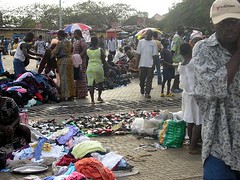
Here's a street market for used clothing.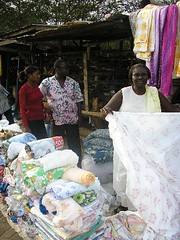
Solomon, Charlotte at her auntie's place, where I bought a towel. Though I think it may be gross to buy a second-hand towel...
There was an engagement ceremony at the compound the day I moved in. A worker at the compound was getting engaged to another worker’s brother. There were two groups of plastic chairs facing each other, with a representative for the bride and one for the groom standing in the middle. This is when the man’s family brings the things that the woman’s family has requested and the exchange is made. I couldn’t follow everything that was going on because it was in Ga, so don’t count on this information 100%. I’m sure I’ll be going to more engagements and weddings and will fill in details as they become available to me.
It seems that the woman gets clothes, shoes, jewelry, some wine and a bit of money (maybe about $100, depending on the tribe and the class) as dowry. The engagement is a time for negotiation and the man’s family can try to lower the rates. At Saturday’s event, some of the man’s family (my side of the chairs) got up and went aside to discuss something. Later, it was the woman’s family’s turn to hold a side pow-wow.
Most of the people at the engagement were women, though there were a few men. One of the men was very vocal in his singing and Amen-ing. So much so that I thought he might be hamming it up in an insincere, jerky way. But F. (my housemate) assured me that he was genuinely into it. The bride’s representative sang several times and her voice quivered, making me think of a munchkin from the Wizard of Oz.
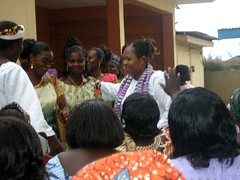
The bride is the third from the left.
Eventually, the woman and groom came out (from separate places). The families and couple walked/danced in a line through the middle briefly. Neither of the couple looked particularly happy, but I’m told that is in their personality, rather than a cultural norm. The engagement rings were in a red case shaped like a fish (it’s not always a fish) and a woman presided over the exchange of rings (usual). The representative of the bride made the bride spin around and said that she has no marks on her body now and that when she returns home, there shouldn’t be anything; a nice way to say they won’t allow for her to be domestically abused.
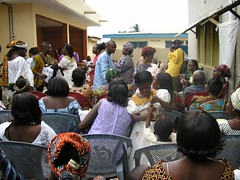
The groom is in the light blue. Ring around the rosy with the family.
After the exchange, the guests are treated with glass bottles (!) of Coke and cake and given small tokens (this was a plate and hand-held plastic fan). The engagement and wedding can be on the same day, or as much as a year or two apart. One girl in my office said her church always has the wedding 3 weeks after the engagement. The wedding (in a church or court) can be done whenever the couple wants (i.e. have money), but is not compulsory. After the engagement, it is morally acceptable for a couple to live and/or sleep together.
Valentine’s is the biggest I’ve ever seen it here. No confection hearts or little dinky cards as far as I could tell, but lots of real cards, roses, and the chocolate all seemed to be missing from the supermarket. Businesses and restaurants have emphasized Valentine’s over the few years, offering discounts and specials. Celebration driven by consumerismm. I wandered down Oxford Street and it was crowded with couples decked out in red or singles on the prowl. The restaurants were packed; I settled on Nando’s to avoid a long wait (and because the pizza place next to it had stopped serving the small personal sized pizza! Hmph! We single people were most assuredly being discriminated against!)
Somehow Valentine’s Day in Ghana has become about sex, not love. I was told that condom sales always skyrocket and stores run out, meaning that either people don’t normally use condoms or else there is just a whole lot more action going down on Feb 14 than normal. However, I saw some prominently displayed by the supermarket checkout. Na tells me that some girls are more willing to sleep with someone under the rationale that “everyone else is doing it.” I’ve heard that preachers tried to reclaim the holiday for love through sermons this Sunday as well.
In yesterday’s local paper was a full-page ad from the Ghana AIDS Commission:
The Beauty of Love is in Careful Living
Let This Valentine Bring Out the Beauty of Love
Avoid Casual Sex Remember
HIV/AIDS is Real
Be Wise
Abstain
Be Faithful
Condom Use Consistently & Correctly
I read in the paper that there are 450,000 people in Ghana with HIV/AIDS; I think it said that's about a 3% rate. That's a surprisingly low figure given that this is Africa.
I’m in heaven! Since moving to my new place on Saturday, I’ve had a spring in my step. This is a Ghana I could live in long-term, with a flushing toilet indoors and a shower even! And within walking distance of internet cafes, my office, a supermarket, etc.
Saturday night I ate Indian food! There were only other foreigners in the restaurant, with Ghanaians serving. I couldn’t help but think about the racial dimension of it all, though my Haitian-American housemate and her sister were with me. My meal ended up costing $6.50 US! I was shocked that it was that expensive. My chicken pita and rice at Nando’s last night cost nearly $5. But I got rice and a hunk of meat at a food stall for lunch for $0.50, so I know that it’s possible to eat cheap. I’ve just got to wander around a bit and find those places. They’ll be less restaurant-y and more food stall-y, but that’s fine by me.
I woke up this morning from a dream and realized everyone in it was black (I can’t recall details enough to know if they were African or African-American). I’m pretty sure that’s the first time ever. I suppose it’s a precursor to those dreams in other languages that people in foreign countries have. But I haven’t picked up enough language for that to happen yet. And I doubt I ever will. I have noted a new sound in my vocabulary that is on its way to being a Ghanaian sound, which I haven’t figured out how to record so you can get a sense for the sound…
Learning another language is only as easy as the people who teach you make it. When I ask how to say something here, so far I’ve been getting whole phrases and I don’t know what each singular part means. I think I’d prefer phonics. That way, I can build my own sentences as I learn more vocabulary.
If I’m with more than one person, they ALL say the words/words at once, so I can’t follow it. A chorus effect is not conducive to being able to hear proper pronunciation.
Often, after I learn one expression in a language, someone tells alternative ways to say the same thing. WOAH, doggie! I only need one way right now. That’s enough to handle. Why fill my brain with synonyms when I could be adding vocab?! Add to that that some people try to teach me the same thing in another tribal language before I’ve even fully internalized it in the first.
Progress is slow.
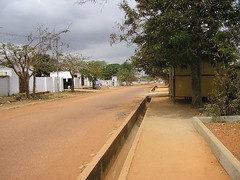
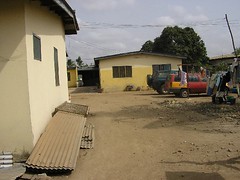
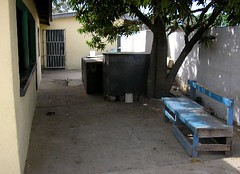
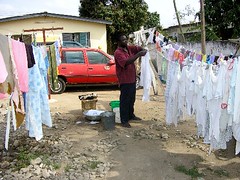
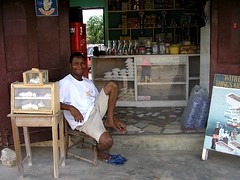
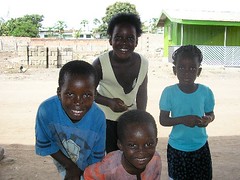
Everywhere there are stores with names that invoke God and Jesus: The Lord Will Provide, Not by My Strength but by God’s will, The Lord is my Shepard. The back of tro-tros sport pictures of Jesus, Mary, or religious sayings.
Seeing the pictures, I couldn’t help but think about the fact that Jesus and Mary are white. I recently read The Autobiography of Malcolm X, in which he talks about how Christianity has forced the black man to worship a white God. You would think that people would worship a God in his own image (the converse of God having created humans in his image). I asked Solomon about it, but it seemed it had never occurred to him. I still feel that this is unresolved in my mind and will keep asking around about it.
I woke up Saturday morning to songs like “Jesus, I adore you” and “I live to worship you, Lord.” On Sunday, I was forced to watch a VCD about an American women’s faith conference, full of singing “Yes Lord, Yes Lord, Yes Yes Lord.” Solomon told me that these are my people, but I vehemently denied that: these are the ones who voted for Bush.
As far as I can tell so far, the women’s rights movement here has nothing to do with the right to choose, a fundamental part of the American feminist agenda. Abortion is illegal, but still happens (even in hospitals). The influence of religion and the desire to push forth other priorities (violence against women, inheritance rights, etc) make it a relative non-issue.
I rant to my sister about those preachy, over the top, religion-in-your-face type Christians. I usually have great distaste for that. She thinks I’m intolerant. The truth is, I behave quite well while in the presence of such people, but can complain to my sister after the fact to get it off my chest. When my Eritrean client and his family told me that I would go to hell if I didn’t accept Jesus as the son of God and said they would pray for me, I smiled pretty. I knew they meant well.
My college boyfriend hated seeing the flyers for Living Water, the religious singing group. So I would take the signs and post them on his door or leave them in his mailbox on purpose. It didn’t annoy me as much when I could use it to annoy him, jokingly. I keep thinking how he would go crazy here.
Forget the bucket baths and long transportation; this religious bit just may be the death of me here.
Solomon and I caught a bus back to his house on Friday afternoon, instead of a tro-tro. The buses have 4 seats per row and then a 5th flips down into the middle aisle. The bus guys (the ones who collect the money) insisted that 6 squeeze into each row, packing us in like sardines but maximizing their money. That means that there were roughly 75 people in this particular bus. And I, the foreigner to be seen, was dead center in the middle.
I was in for an interesting ride, though not a wholly intelligible one. For this was an infomercial on wheels, with a captive audience if ever there was one. The man at the front of the bus began working the crowd right from the beginning. A few grumbled about the extra person per seat, but he told them not to be annoyed and began his stand-up comedian routine. He was probably somewhere in his mid-40s, though most people have been older than I thought so far. The hair framing his face was just starting to gray. His sweat was visible from where I sat 6 rows back and he would wipe his face periodically with a handkerchief, but not always before a big sweat drop would roll from his forehead down the side of his nose.
I was sitting attentively, trying to figure out as much as I could about what was going on, though most of it was not in English. A few English words would stumble out, in the middle of an otherwise incomprehensible sentence, encouraging me to keep listening. But not only was I listening, I was watching. From the general tone, gestures, facial expressions of the man and the sly, shy smiles of the people (as if they were trying not to smile), and the laughs of a few of the uninhibited, I sensed that the jokes were a little off-color. That was confirmed when the young woman next to me muttered, “He’s not in the Bible.”
He would say something sternly, as if angry, then break into a smile at the end of the rant, exposing his missing front tooth. At some point, he became a preacher, drawing a few Amens from the crowd. “Marriage is an understanding. Marriage is not about love. Love is a lie,” was the longest string of English words. “Beat wives,” “cassava leaves,” “don’t be annoyed.” Add teacher and doctor, as he began to talk more about the product he was selling. The box said it could be used in the treatment for piles, increasing men’s strength, painful menstrual pains, and dimness.
In the end, I couldn’t help but think he was a magician, considering the number of people who reached for their pocketbooks while their hands shot up into the air to buy (at least 10 boxes). The price is about $2 US for a month’s worth. The expiration date was 2005, so when someone asked, the man said simply, “December.”
I had never considered the similarity in skills shared by successful politicians, salesmen, preachers and con men: engage the audience, make ‘em laugh, and talk about God. I couldn’t help but think that this mode of communication would be an innovative tactic to use for public education, awareness raising, even political campaigning. The people didn’t shush him, no one challenged him. Where they just tired from a long week of work? I was initially skeptical that these pills would work and surprised at the naivety. But then again, maybe they know something I don’t? What if it does work? $2 seems to be a lot for a Ghanaian within normal means. Would they just throw it away for that?
When I was recalling this spectacle to my housemate, her son’s nanny Na said that these peddlers are often Nigerians who take the real pills out of those boxes and replace them with fakes. Meaning, I gather, that there are real pills that actually work, curing “everything but hunchback and AIDS.”